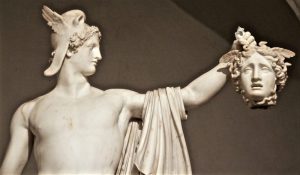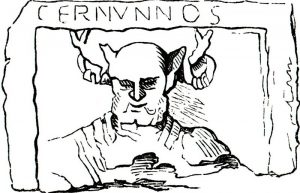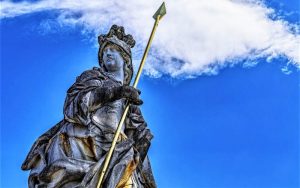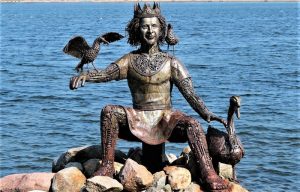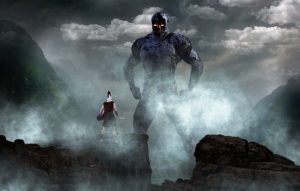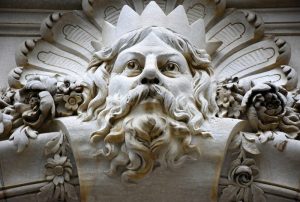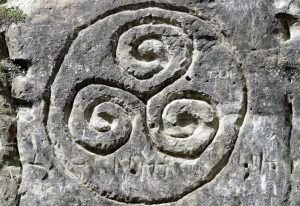Perseus
Perseus was one of the greatest and oldest Panhellenic heroes of Greek mythology. Famously he killed the feared Gorgon Medusa, whose gaze could turn men to stone, a feat that followed quickly with the daring rescue of Princess Andromeda from a monstrous sea creature sent by Poseidon to terrorize the kingdom of Ethiopia. Perseus is perhaps the oldest of the Greek heroes, with depictions of the decapitation he made of Medusa Gorgon among the first mythological scenes to appear in art. Even in mythology, it is believed that he lived three generations before the other great hero Hercules, who was himself a generation before the Trojan War.
Who was Perseus?
Son of Zeus and Danae, Perseus was one of the most important heroes of Greek mythology considered a demigod, and who carried out various supernatural tasks including killing Medusa and liberating Andromeda.
Characteristics
The main characteristics of Perseus are as follows:
- He was a Greek mythological demigod.
- He fell in love with Andromeda and asked for her as his wife.
- He was in charge of watching over the welfare of the good ones, for this reason he offered honor to the gods of the time.
- His humility and sensitivity were an example for many men who lived at that time.
- He had seven children with Andromeda.
- When he was born, he was thrown into the sea along with his mother by Acrisius.
What does he represent?
Perseus represents an important hero within Greek mythology, like most heroes of mythology, Perseus’ genealogy makes him the son of a god and a mortal. Perseus is recognized as the legendary founder of the Peloponnese city of Mycenae, home of Agamemnon, the leader of the Greek forces in the Trojan War, and the father of the legendary ancestor of the Persians.
History
According to versions, an oracle had announced to Acrisius that he would die at the hands of his grandson and in order to avoid it, Acrisius locked his daughter Danae in a bronze tower, but, the king of the gods, Zeus, transformed himself into a horoscope rain that fell on Danae and left her pregnant.
Acrisius threw Danae along with the child into the sea in a wooden chest, but the mother and son survived by reaching the coast of the island of Sepphires. The island was ruled by King Polidectes and his brother Dictis, who picked up the woman and the child, whom he raised as if it were his son.
Perseus grew up with his mother and the king, but Polidectes fell in love with Danae and planned to eliminate Perseus by threatening him and saying that his mother would be sacrificed if he did not bring Medusa’s head. Perseus began his journey and when the gods learned of his courage, they helped him, and each provided him with an object.
When he arrived, he saw that Medusa’s three sisters were asleep and he used a mirror to see Medusa and when he could he cut off her head and then returned home. From Medusa’s blood were born the breeder’s monster and the winged horse Pegasus.
On his way back, he met a maiden named Andromeda who was tied to a rock to be eaten by a sea monster, Perseus released her and fell in love with her, turning the monster into stone with the head of Medusa.
Perseus and Medusa
Perseus had to locate the three Gorgons Witches in North Africa so that, they could reveal Medusa’s location to him. When Perseus arrived, he stole the Witches’ eye and forced them to tell him how to get to Medusa.
When he arrived at the place where Medusa was, he was able to observe that Medusa’s other three sisters were sleeping. He used his shield as a mirror so, in this way, he did not have to look at her directly. When he saw that it was the best time, he cut off Medusa’s snake-filled head with his sword, put it in the sack, and returned home. According to history, the blood spilt by Medusa gave rise to the monster Crisaor and the winged horse Pegasus.
Perseus and the Gorgon
The Gorgons were three sisters called Esteno, Euriale and Medusa who were transformed into monsters. Perseus, son of the god Zeus and Danae, assumes the task of killing Medusa to save her mother from forcibly marrying Polidectes. The Gorgon Medusa used her gaze to turn anyone who saw her into stone, so Perseus needed the help of the gods to defeat her and cut off her head.
King Hades of the underworld lent him a helmet that made him invisible and Hermes, the divine Messenger, gave him a pair of winged sandals while Athena, the goddess of Wisdom, gave him a shield that served as a mirror. Perseus could see Medusa’s reflection on the shield and cut off his head without having to look directly at his face.
Perseus and Andromeda
In Greek mythology, Andromeda was the beautiful daughter of King Cepheus who said her daughter was much more beautiful than the Nereids, who were the nymphs of the sea and daughters of Neptune. They were offended and told it to their father who, furious by the proud attitude of humans, sent to flood the cities of the kingdom and sent a sea monster who devoured people.
The oracle of Zeus told Cepheus that the only way to calm the wrath of the god was to offer his daughter Andromeda as a sacrifice, and so he ordered her to be chained to the rocks of the cliff so that the beast could eat her.
Perseus, who was passing through the place after killing Medusa, saw the beautiful young woman chained and fell in love with her beauty. Perseus then proposed to the king and father of the young woman that, if he killed the beast, Andromeda would be given to him as his wife. Cepheus and Cassiopeia agreed, and Perseus returned to the cliff. As soon as the monster appeared Perseus used his helmet to make himself invisible and his winged slippers and after a fierce battle, he killed the beast by wounding it in the side with his sword and cut the chains that held Andromeda.
Parents
Her father was Zeus, the king of the gods, who, not being able to be with Danae because she had been locked up by her father, became a rain of gold that fell on Danae, thus leaving her pregnant.
Wife
He married Andromeda after rescuing her from death. She was the daughter of Kings Cepheus and Casiopeda.
Sons
Along with his wife, Perseus had seven children. A daughter named Gorgófone and six sons, known as the Perseids: Perses, Alceo, Méstor, Heleo, Electrion and Esténelo.
Curiosities
Some curiosities of Perseus are:
- There is a constellation with his name, and it is located between the constellations of Cassiopeia, Auriga, Taurus, Aries and Andromeda and a sculpture was made in his honor in Florence, where he is seen lifting Medusa’s head.
How to cite this article?
Briceño V., Gabriela. (2019). Perseus. Recovered on 3 January, 2025, de Euston96: https://www.euston96.com/en/perseus/
